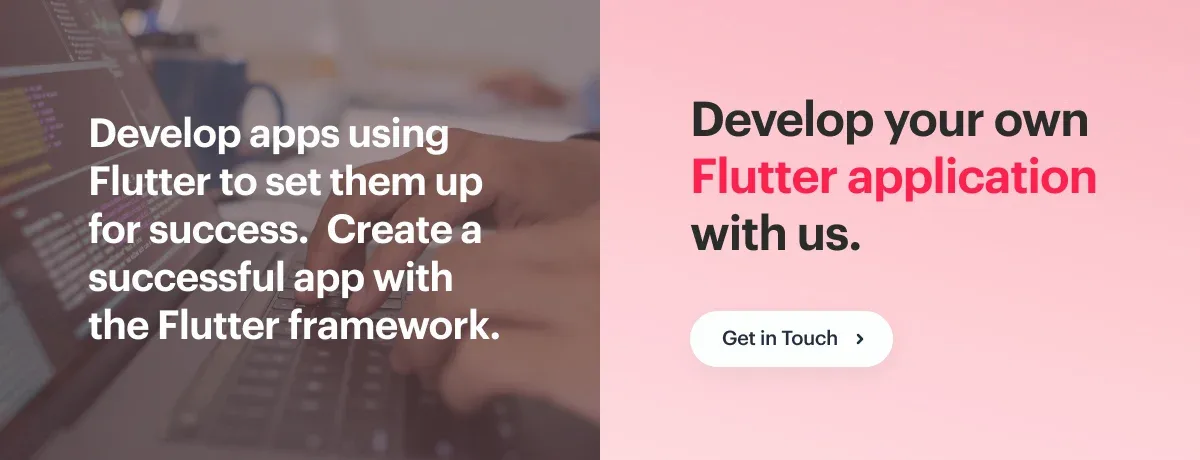KlasterMe, Google Ads, Cryptograph, Postmuse, Pairing.
What do all these apps have in common?
They are made on the same cross-platform mobile app development framework- Flutter.
Why were the apps made on Flutter over React Native Development?
With such a wide range of cross-platform coverage both frameworks are the top choice for developers.
But that doesn’t explain why Flutter took precedence in these app.
So, in this blog we will see the advantages of Flutter and they make it a better choice than ReactNative.
Without further ado, let’s take a look
Development
Flutter apps are built using Dart, an object-oriented programming language with a syntax inspired by C-style languages.
This contributes to a more streamlined development process compared to React Native, which primarily uses JavaScript. Dart's focus on readability makes it easier for developers to write, understand, and maintain code, leading to a more straightforward development experience.
A significant benefit of Flutter is its use of the Skia Graphics Library, which simplifies UI adaptation to screen changes. This can reduce the need for manual adjustments compared to React Native, where achieving similar effects might require more code.
Time and Effort Efficiency
While all cross-platform frameworks save time and money by allowing a single codebase for multiple platforms, Flutter excels in reducing the development effort. Its architecture is designed to minimize redundant work, particularly during the testing phase.
This means faster turnaround times and more efficient project completion.
Hot Reload
Are you going to roll out an MVP?
Is it time for your application to be taken down for an update?
This is where the glaring obvious comes in- Flutter is better than ReactNative
Flutter’s Hot Reload feature is the reason.
You update the code, and the app can get updated directly and quickly- that’s the magic.
Chances of downtime automatically lowered!
Not to mention debugging gets reflected just as fast.
In React Native, reflecting takes time.
Performance
Let’s look into performance.
Flutter or React Native, which is better?
Well, Flutter gives smooth loading, quick reflection of changes, and easier testing.
What’s more?
A fantastic speed to 60fps.
Also, top-notch quality thanks to the JavaScript bridge.
You know which framework to pick.
Toolkit
The rich UIs, the lifecycle management tool, and various widget libraries are all part of Flutter.
While React Native does have a good library, it does not shine past Flutter’s widgets.
The widget library is a shining star after Hot Reload.
It’s versatile enough for you to create two very different apps from the same framework.
Take the glaring difference between Cryptograph and Pairing.
In React Native, for a versatile showcase of apps, developers are given tool creation capability instead of in-built options.
Depending on which one of these you like, choose your framework.
Support
Flutter vs React Native community?
Flutter has a robust support system to resolve issues- fast and efficient whereas React Native community is all about adding to the library.
Many developers have contributed to the framework in both cases.
And let’s not forget the continued integration and development tool, Nevercode, which has significantly contributed to Flutter in this matter.
Even now, Flutter’s community keeps growing.
It can resolve any issue you might have quicker than any other framework.
If debugging is your priority post launch, establish yourself in Flutter.
Conclusion
When choosing a framework for app development, you have to think long-term.
It is the foundation. Frameworks are where you form your app, code, debug, launch, and basically- EXIST.
Choosing a stable and credible framework like Flutter will be advantageous to your app to go beyond the extra mile.
If you are looking to create versatile kinds of apps choose flutter framework.
Or better.
Let us handle the developing aspect while you take the business.
Frequently Asked Questions
Ques: Is it possible to integrate Flutter into existing native codebases?
Ans: Yes, integrating Flutter into existing native codebases for Android and iOS is feasible. Flutter supports this with detailed guides and tools, offering a pathway to leverage Flutter's features within existing applications without starting from scratch.
Real-world practices include the use of an "umbrella module" for managing multiple Flutter modules within a native app, demonstrating Flutter's adaptability in complex app environments (Flutter documentation)


